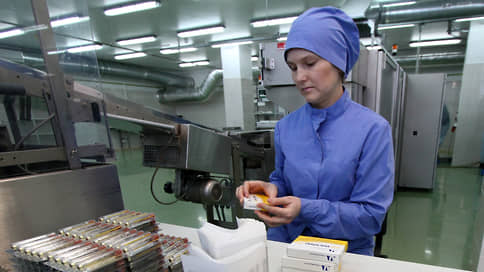Insulin was injected into prices
[ad_1]

In June-August, the cost of Russian insulins under state contracts, despite the increase by the regulator of the maximum registered prices for some of them, on average almost did not increase, and even decreased for some items. The reason is in the peculiarities of the legislation on public procurement, which allow customers not to take into account the new cost of drugs, as well as the ability of large manufacturers to restrain prices. As a result, the share of failed trades increased and the alignment of forces in the market changed.
Kommersant had at its disposal the calculations of the Headway Company, according to which the average prices of analogue insulins aspart and glargine under government contracts from the large manufacturer Geropharm increased by only 3.3% in June-August. Moreover, the company agreed to supply insulin lispro by an average of 0.8-5% below the limit price, despite the fact that Geropharm in early summer achieved a 16.6% increase in the limit price of this particular drug through the Federal Antimonopoly Service (see Fig. “Kommersant” dated June 16). In general, the department increased prices for Geropharm by 5.5–18%, depending on the type of insulin. The company explained the need for price increases by increasing the cost of logistics and other costs.
Roszdravnadzor feared a shortage of drugs that diabetic patients are provided at the expense of budget funds. Therefore, the Urals Medsintez (by 8% for aspart) and the Danish Novo Nordisk (by 15.7% for two-phase aspart) also achieved price increases. The prices for genetically engineered human biphasic insulin and insulin isophane, produced by a number of Russian and foreign companies, have also changed.
The rejection of a serious increase and even a decrease in prices allowed Geropharm to increase its share in the public procurement segment in seven months, according to Headway Company, to 23.3% against 19.6% a year earlier. The company most noticeably strengthened its share in lispro sales — by 10 percentage points, to 68.8% yoy. Geropharm confirmed to Kommersant the increase in the share in the first half of the year for certain types of insulin and expects further growth by the end of this year.
Now the purchase prices for state tenders are constrained by the regulations for determining the initial price of the contract, explains Sergey Karpuntsov, Deputy Director of the Sales Department of Geropharm. To increase them in accordance with the decisions of the Federal Antimonopoly Service, changes must be made to the order of the Ministry of Health No. 1064n, which prevents now from announcing auctions at re-registered prices, he adds. Even with re-registration, the previous cost remains in the register of marginal prices, and the customer is obliged to choose the “minimum of the minimum,” explains Alexei Fedorov, director of the Research Center for Good Procurement Practices. This problem, according to him, has been repeatedly stated by pharmaceutical manufacturers.
If, due to the low price, the auction is declared invalid, the customer can announce a new tender at a higher marginal cost from those available in the register, the expert continues. Due to such a regulatory feature, according to Sergey Karpuntsov, “a significant part of the auction” did not take place. “For some drugs, the share of such tenders exceeded 50%,” he says.
According to Kommersant’s estimates based on public procurement data, in June-August, due to the lack of supplier applications, about 28% of announced state tenders for the purchase of various types of insulin did not take place. This is in line with the average: according to the Headway Company, in the first half of the year, government customers canceled 32% of announced tenders for the purchase of a wide range of medicines.
Other factors could also have contributed to the decrease in purchase prices for insulin. For example, distributors have stocks of the drug purchased at the previous price, and besides, there is competition in this segment now, which allows government customers to find suppliers at any initial cost, Aleksey Fedorov believes. In Russia, competition is high only in the segment of human genetically engineered insulins, but not in analogue ones, says Nikolai Bespalov, RNC Pharma Development Director. In his opinion, the cost of production still probably allows Geropharm to supply according to the conditions proposed by state customers.
[ad_2]
Source link





